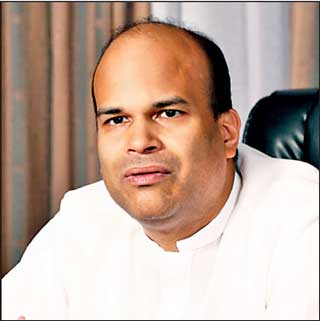Monday Feb 23, 2026
Monday Feb 23, 2026
Friday, 21 January 2022 00:00 - - {{hitsCtrl.values.hits}}
 |
| Sri Lanka High Commissioner in India Milinda Moragoda
|
TIMES OF INDIA (NEW DELHI): The economic roadmap charted by India and Sri Lanka, which has seen a slew of measures by the former to mitigate its island neighbour’s mounting debt crisis, will help
address the trust deficit between the two countries and also render “peripheral” concerns over Chinese activities in the country, Sri Lankan High Commissioner Milinda Moragoda said on Wednesday, 18 January.
Talking to TOI from Colombo, a day after India announced a $ 500 million credit line to help Sri Lanka purchase petroleum products, Moragoda said President Gotabaya Rajapaksa was leading efforts to restructure the Sri Lankan economy and that India was going to be the key to this process.
“Once we start working in the thrust sectors like electricity, where the natural relationship is with India, there will be no need for these concerns. We should get on with the plan, stay determined and the rest will follow,” said Moragoda, adding it was important to move quickly from the transactional to strategic phase of the relationship.
The High Commissioner identified petroleum and gas, electricity, ports and connectivity, exports, manufacturing and tourism among major thrust areas for cooperation that can lift the relationship in a “tangible and meaningful way”.
While many see easy Chinese loans as having precipitated Sri Lanka’s economic crisis, Moragoda said the current economic predicament was a result of years of spending excesses and that blaming any other country for it didn’t make sense.
“The main issue here, as I see it, is that India is the key to our new economy. India will help us come out of this if we can speed up cooperation in the thrust areas. Sri Lanka’s main economic sector for recovery is going to be tourism, and India is the largest market there,” said Moragoda.
The Indian Government had been concerned last year about the speed with which the Sri Lankan Government was expediting work on Chinese projects even as it walked out of an agreement with India and Japan to develop the East Container Terminal (ECT) at the Colombo port.
The Trincomalee oil farm project was seen as an example of the lack of progress in bilateral projects, which was of concern to India.
Things seem to be looking up though with Sri Lanka turning to India for assistance in dealing with the crisis. Seen as significant for bilateral energy security, the proposed agreement for development of the Trincomalee tank farms was approved by Sri Lanka earlier this month. Moragoda said work is also expected to begin next month on the Colombo port’s Western Container Terminal (WCT) that will be developed by the Adani group. Sri Lankan Finance Minister Basil Rajapaksa recently assured Foreign Minister S. Jaishankar that Colombo will work to create conditions conducive for Indian investments in a range of sectors.
During Basil’s visit to India last month, India and Sri Lanka had identified ‘four pillars’ for economic engagement that would also help revive the Sri Lankan economy. These included a food and health security package on an urgent basis, energy security package that would include a line of credit to cover import of fuel from India, offer of a currency swap and also facilitation of Indian investments in different sectors in Sri Lanka. Moragoda said work on these pillars would help in “short-term stabilisation”, and focus on the “thrust areas” in the medium-term will ensure that Sri Lanka emerges unscathed from the current crisis.